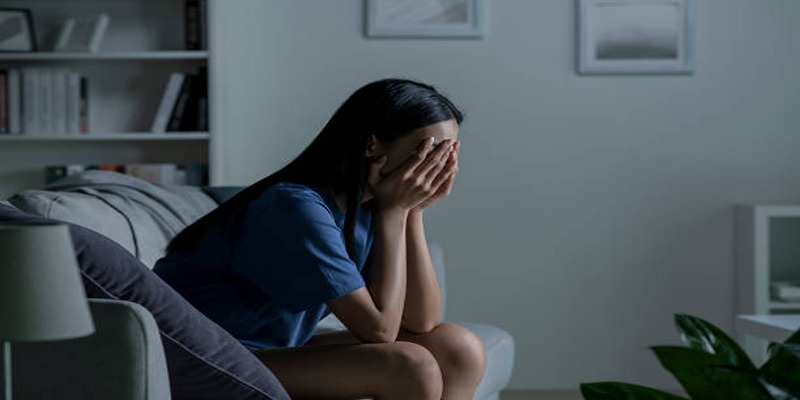Depression is a common mental health condition that affects millions of people worldwide. It involves feelings of sadness, hopelessness, and a lack of interest or pleasure in daily activities. The causes of depression can be complex and may include factors such as genetics, life events, medical conditions, and changes in brain chemistry. Symptoms can vary widely from person to person and might range from mild to severe. It is important to understand that depression is a real illness and not simply a sign of weakness. By exploring what triggers depression, we can better recognize its symptoms and seek appropriate help.
What is Depression?

Depression is a mood disorder that can have a profound impact on an individual's thoughts, emotions, and behaviors. It is more than just feeling sad or down for a short period of time it is a persistent and chronic condition that can significantly impact daily functioning. Depression can also lead to physical symptoms such as changes in appetite, sleep patterns, and energy levels.
Causes of Depression
There is no single cause for depression, and it can be caused by a combination of factors.
Genetics
Research has shown that genetics play a significant role in the development of depression. Individuals who have a family history of depression are more likely to experience it themselves. Studies suggest that various genes can influence the development of depressive disorders, but it is not entirely deterministic, meaning not everyone with a family history will develop depression. This implies that genetics may interact with other factors, such as environmental influences and personal experiences, to increase susceptibility to depression.
Life Events
Depression can be caused by stress-related life events for instance, bereavement, financial problems or a serious illness to mention but a few. Such occurrences may interfere with the normal operations and lead to swell up feelings of sorrow, loss or anxiety.
Medical Conditions
Some diseases such as chronic pain, cancer and hormonal imbalances also predispose one to depression. Various chronic diseases cause physical and emotional strain through which they may develop depressive episodes. Medications for these diseases can also produce alterations in the brain body chemistry that are likely to put the patient in a vulnerable position to acquire the illness.
Changes in Brain Chemistry
Research has shown that changes in brain chemistry, specifically an imbalance of neurotransmitters like serotonin and dopamine, can play a role in the development of depression. These chemicals are responsible for regulating mood, emotions, and behavior. When there is an imbalance, it can lead to symptoms of depression.
Symptoms of Depression
The symptoms of depression can manifest differently in each person. Some individuals may experience mild symptoms that do not significantly impact their daily lives, while others may have severe symptoms that interfere with work, relationships, and overall quality of life. Common symptoms include:
Persistent Sadness
One of the hallmark symptoms of depression is persistent sadness or a low mood that lasts for most of the day, nearly every day. This feeling is typically unshakeable and does not improve with changes in circumstances, unlike temporary sadness, which usually resolves in response to positive events or the passing of time.
Loss of Interest or Pleasure
People suffering from depression frequently lose interest in activities they once found enjoyable, a condition known as anhedonia. This diminished engagement can impact hobbies, social interactions, and even relationships, leading to increased isolation and intensifying feelings of loneliness and sadness.
Changes in Appetite and Weight
Depression can significantly impact appetite, leading to either an increase or decrease in food consumption. Some people may experience weight gain or loss as a result. These changes are generally unintentional and can contribute to negative body image and self-esteem issues.
Sleep Disturbances
Sleep patterns are commonly disrupted by depression. Individuals might experience insomnia, finding it difficult to fall or stay asleep, or they might oversleep, known as hypersomnia. Both sleep disturbances can cause further fatigue and exacerbate other symptoms of depression.
Fatigue and Lack of Energy
A profound sense of fatigue and lack of energy is frequently reported by those with depression. This chronic exhaustion can make even simple tasks feel insurmountable and can diminish motivation and productivity, both at home and in professional settings.
Difficulty Concentrating
Cognitive symptoms such as difficulty concentrating, making decisions, or remembering details are also associated with depression. These issues can interfere significantly with work or school performance and everyday tasks, adding to the stress and frustration for the individual.
Feelings of Worthlessness or Guilt
Ruminating on perceived failures, feeling worthless, or excessive guilt over past actions are common during depressive episodes. These thoughts can be debilitating and often contribute to further withdrawal from social and professional environments.
Physical Symptoms
Depression might also present with physical symptoms such as unexplained aches and pains, headaches, or digestive issues. Since these symptoms can mimic other medical conditions, they can sometimes complicate the diagnosis and treatment of depression.
Suicidal Thoughts or Behaviors
In severe cases, individuals with depression may experience thoughts of death or suicide. It is crucial for these individuals to seek immediate help from mental health professionals. Suicidal ideation is a medical emergency, and support is necessary for the person to find hope and seek recovery.
Treatment for Depression

Depression is a treatable condition, and many individuals can find relief from their symptoms with appropriate treatment. Some common treatment options include:
- Therapy: Various forms of therapy, such as cognitive-behavioral therapy (CBT) or interpersonal therapy (IPT), can help individuals identify thought patterns and behaviors that contribute to their depression and develop coping strategies.
- Lifestyle changes: Simple lifestyle changes like regular exercise, a healthy diet, and adequate sleep can improve mood and overall well-being.
- Support groups: Joining support groups or engaging in peer-led programs allows individuals to connect with others who understand their experiences and provide support and encouragement.
- Electroconvulsive therapy (ECT): In severe cases, ECT may be recommended, particularly when other treatments have not been effective. This treatment involves passing electrical currents through the brain to trigger a brief seizure, which can help improve symptoms of depression.
Conclusion
Understanding depression is crucial for promoting awareness and compassion in society. This complex mental health disorder is influenced by various factors, including genetics, life events, medical conditions, and changes in brain chemistry. While depression presents numerous symptoms, from persistent sadness and loss of interest to more severe effects like suicidal thoughts, it is important to know that effective treatment and support can lead to recovery. Encouraging open dialogue, providing access to mental health resources, and fostering supportive environments can help those affected by depression to seek the assistance they need.










